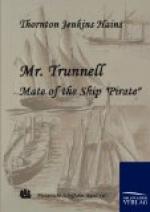She let me hold her hand and looked up into my eyes.
“I never said any such thing—that I didn’t care for any one,” she replied.
“Then do you, Jennie?”
She made no answer, and let her eyes fall. I let go her hand and drew myself up, for I was uncertain.
“I say, Rolling, what the deuce are you two doing?” bawled the voice of Jackwell from the companion, and then I realized that there was little privacy aboard a ship of three hundred tons.
We went aft guiltily, and met the rest coming up the companion with bottled beer and sandwiches which were served as refreshments. Chairs were set out by the old mate and two harpooners who had come aft, and the cook spruced himself up to get us out a plum-duff for lunch. From where we sat behind the poop rise, nothing could be seen forward, and here we ate and drank while Jackwell laughed and talked incessantly, being a completely changed man from the sarcastic and somewhat truculent skipper I had known for the last three months. It was finally suggested that as the awning was stretched, the plum-duff could be served on deck better than below in the stuffy cabin, so here we enjoyed the meal.
XXII
While we ate, Jackwell expanded more and more under the influence of duff and beer. He leaned back in his chair and gazed at the mainmast.
“What makes the top of your mast so black, hey? Is it the smoke from the kettles, or have you been afire? Sink me, Henry, there couldn’t have been any such luck as your old hooker afire and being put out, hey? Ha, ha, hah! that would have been asking too much of the devil.”
“It’s hollow,” said the old mate.
“What? Hollow? What the deuce is your mast hollow for?”
“Well, that is a question, isn’t it, Mrs. Sackett?” said Henry. “Perhaps he asks you sometimes what a smoke-pipe is hollow for, don’t he? I never seen such a funny man. But he’ll never get over it, I want to know.”
“Is it really hollow?” asked Jennie of the old mate.
“Yessum, it certainly is. Why, it’s the smoke-pipe, you know,” was the reply. “We have an engine in the lazarette that’ll take us along more’n three knots in dead calm weather. It’s been a lot o’ help, when the wind has been light and ahead, fer picking up the boats. Ye know a whale always makes dead to windward, mostly, an’ if the wind is light and we’ve got to go a long ways, the poor devils would most starve waitin’ fer us, like they used to do in the old times. The lower mast is iron. There’s lots of them that way now. The soot makes the canvas black sometimes, but there ain’t no sparks to speak of ever comes out of that top, as it’s mostly blubber we burns.”
Jackwell became silent for several minutes, and then, as his eyes were still directed at the masthead, I looked again and noticed the topsail yard settled below the lower masthead.




